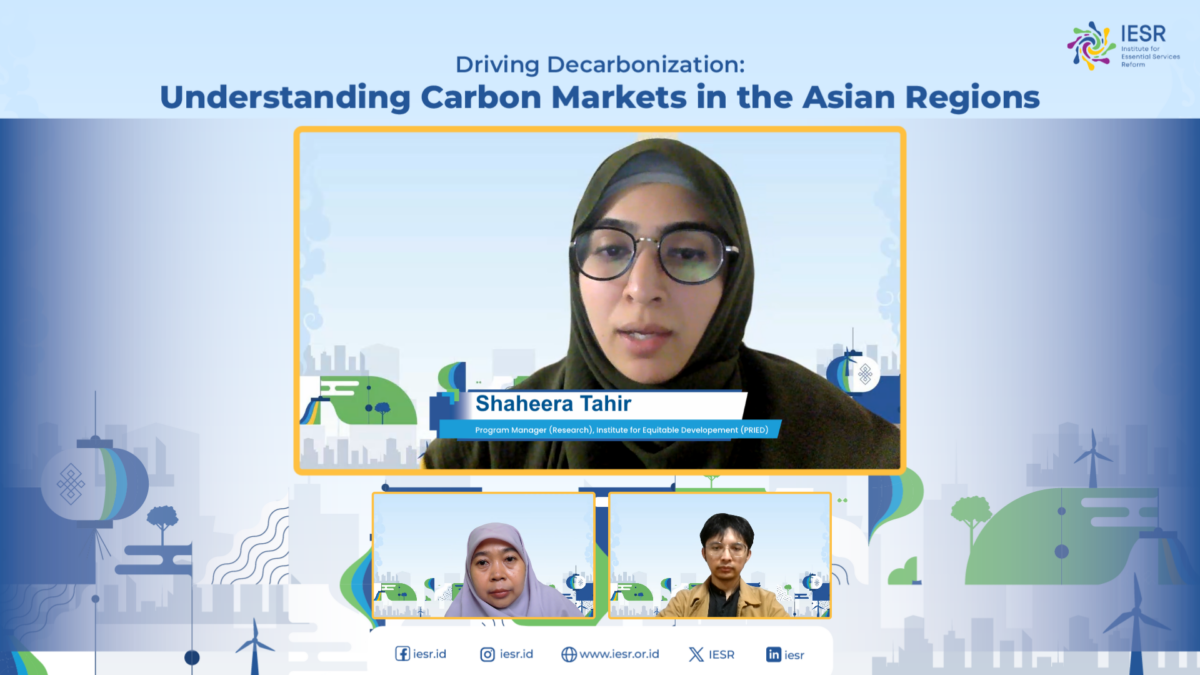Jakarta, 26 June 2025 – The Asian region faces a significant climate finance gap despite being a major contributor to global emissions. Based on data from the Indonesia Monetary Fund (IMF) 2024, the region needs around USD 1.1 trillion annually to meet climate change mitigation and adaptation targets. However, current investments have only reached around USD 333 billion, far from the required figure. This climate finance gap of USD 815 billion per year is a major challenge in dealing with climate change. Under these conditions, the carbon market can help address this gap by providing a price for carbon emissions, creating financial incentives for emission reductions, and directing private capital to climate projects. This was stated by Arief Rosadi, Manager of the Climate and Energy Diplomacy Program, Institute for Essential Services Reform (IESR) in the Regional Webinar Driving Decarbonization: Understanding Carbon Markets in the Asian Region on Thursday (26/6).
“Carbon markets offer a scalable financing solution to unlock previously unavailable private capital. Some success stories from the Asian region include Singapore, which has implemented a carbon tax and emissions trading system since 2019, regulating around 70 percent of the country’s emissions through taxes on 50 major industrial facilities. In East Asia, Japan is leading the way with its Joint Crediting Mechanism (JCM) that facilitates bilateral cooperation, while China operates the world’s largest Emissions Trading System, covering around 8 billion tonnes of CO2e,” Arief stressed.
However, Arief Rosadi highlighted the condition of the carbon market in Indonesia which has not yet met the government’s expectations, with minimal trading activity, low prices, and limited participation. This is due to fragmented regulations and inconsistent standards across ministries as well as integrity issues such as exaggerated baselines in projects and weak monitoring systems, which are further exacerbated by the lack of infrastructure in rural areas. “To that end, Indonesia and other Asian countries must work to align regulations and invest in better Monitoring, Reporting, and Verification (MRV) infrastructure to comply with global standards, including Article 6 of the Paris Agreement. Without these improvements, the carbon market risks becoming merely symbolic and not providing an effective solution to climate change,” said Arief.
Shaheera Tahir, Program Manager (Research), Policy Research Institute for Equitable Development (PRIED) said that Pakistan is at an early stage in developing a carbon market, but has great potential to generate USD 2 – 5 billion if this market is developed and managed properly. The country has participated in the Voluntary Carbon Market (VCM), which allows the private sector to play an active role in reducing emissions and offsetting the impacts of climate change.
Shaheera revealed four steps that need to be taken to develop a carbon market in Pakistan, first, increasing the capacity of developers and potential investors to understand how the carbon credit trading mechanism works. Second, adequate incentives to encourage the private sector to participate in emission reduction projects, especially in the use of renewable energy. Third, accelerating the registration process for carbon projects by reducing bureaucratic barriers and supporting the implementation of emission reduction initiatives in the agricultural sector. Fourth, establishing a national carbon registration system to track and verify emission reduction projects. This also includes transparent data collection on emission footprints and carbon reduction strategies.
Ambiyah Abdullah, Senior Researcher at the Department of Energy Modeling and Policy Planning, ASEAN Centre for Energy stated that ASEAN has set strategic steps to achieve carbon neutrality by 2050, with a primary focus on the energy and transportation sectors which are the largest contributors to emissions in the region. Although financing and regulatory challenges remain large, with technology development and closer regional cooperation, ASEAN has the potential to achieve this goal.
“ASEAN is developing the ASEAN Carbon Market Framework which aims to support the development of carbon markets in the region. The carbon market is expected to reduce barriers to meeting international carbon credit requirements and encourage private sector participation in financing emission mitigation projects. With the right policy support and strong commitment from all parties, ASEAN can achieve this ambitious target and become a leader in global climate change action,” Ambiyah emphasized.

